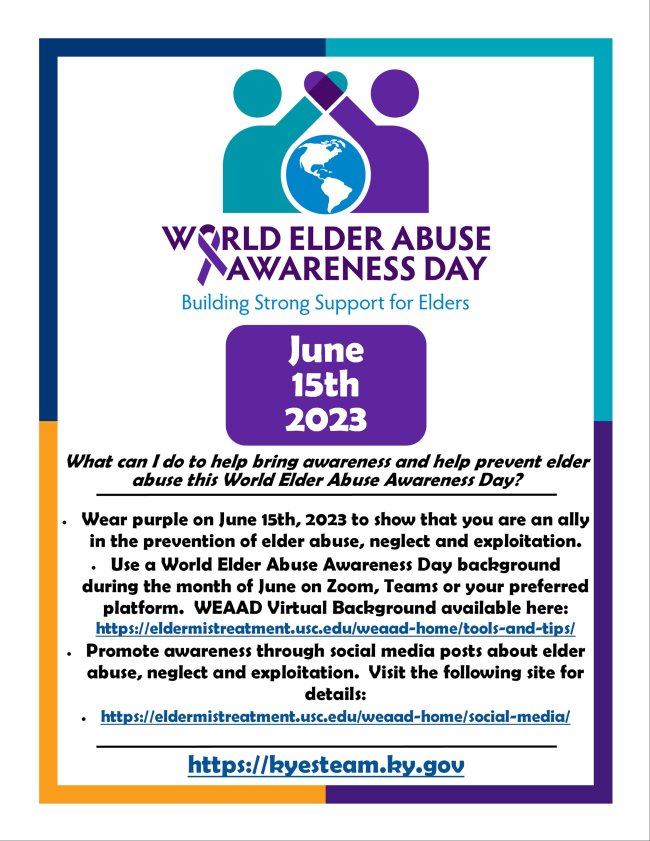
June 15 is World Elder Abuse Awareness Day. Elder abuse is defined as physical abuse, emotional abuse, sexual abuse, financial exploitation, neglect, willful deprivation or abandonment of a 60-year-old or older adult. Here are some facts to be aware of if you suspect someone is the victim of elder abuse.
How many older Americans are abused?
It is estimated that up to 5 million older Americans are abused each year.
Who are the abusers?
Sixty percent of elder abuse is committed by a family member. Two-thirds of these family members are either an adult child or the spouse.
What makes an older adult vulnerable to abuse?
Any older adult is susceptible to abuse, neglect or financial exploitation, but social isolation and cognitive impairment such as Alzheimer’s disease or other dementia are high risk factors.
What are the warning signs of elder abuse?
- Broken bones or fractures
- Poor physical appearance and lack of cleanliness
- Changes in mental status — withdrawal from normal activities, unusual depression
- Frequent infections
- Bruising, welts or cuts, burns, pressure marks, bedsores
- Unexplained weight loss
- Appears frightened or withdrawn
- Refusal to speak
- Signs of dehydration
- Loss of bowel and bladder control
- Sudden changes in financial situation
- Missing personal belongings such as art, silverware, jewelry, TV
- Unpaid bills, such as house payment, rent, taxes, utilities
What are the risk factors that an older person will be a victim of elder abuse?
- Someone with cognitive impairment such as Alzheimer’s disease or other dementia
- Someone who has a history of mental illness
- Someone who has physical disabilities
- Someone who is depressed, lonely, or lacks social support
- Someone who abuses alcohol or drugs
- Someone is verbally or physically combative with the caregiver
- Someone who has a shared living situation
- Someone who has a criminal history
What are the indicators that a caregiver could become an abuser?
- Someone who feels overwhelmed or resentful
- Someone who has a history of substance abuse
- Someone who has a history of abuse toward others
- Someone who is dependent on the older person for housing, finances, or other needs
- Someone with mental health problems
- Someone who is unemployed/underemployed
- Someone with a criminal history
How does a person make an elder abuse report?
Kentucky is a mandatory reporting state, meaning that anyone having reasonable cause to suspect abuse, neglect or financial exploitation has a responsibility to report it. Reports are confidential and can be made anonymously. Contact the 24-hour toll-free Kentucky Elder Abuse Hotline at 1-800-752-6200 or 1-877-597-2331.
Of course, it shouldn’t take assigning a month and a day to remind us to step up, take action and report if we suspect someone is being abused, neglected or financially exploited. But the day’s designation is one way to raise people’s awareness and get the conversation started — and hopefully keep it going — about the increase of elder abuse worldwide.
Information courtesy of the National Council on Aging.